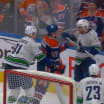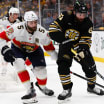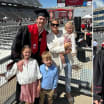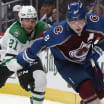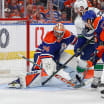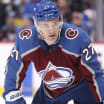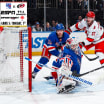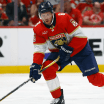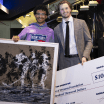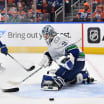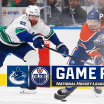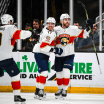This season was supposed to be different for the Washington Capitals.
They finally had a team talented enough and mentally strong enough to go beyond the second round of the Stanley Cup Playoffs and capture the franchise's first championship. Their past playoff disappointments didn't matter, they said.
This team was different, they said.
Yet, here they are again trying to pick up the pieces after having their season ended Tuesday with a shattering 4-3 overtime loss to the Pittsburgh Penguins in Game 6 of the Eastern Conference Second Round.
Capitals need to answer same old questions
Ovechkin, Washington head into another offseason trying to figure out what went wrong
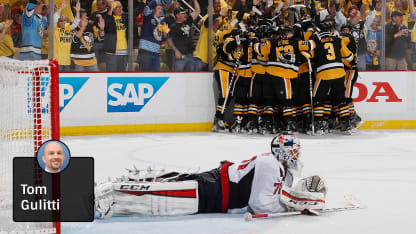
In sifting through what went wrong and determining what needs fixing, you must begin by crediting the opponent.
The Penguins were the better team. They went 33-8-5 over their final 46 regular season games and then steamrolled the New York Rangers in five games in the first round of the playoffs, sending them into the second round bursting with confidence and a hot goaltender in 21-year-old rookie Matt Murray.
"They did a really terrific job down the stretch being the hottest team in the National Hockey League and they carried it over to the playoffs," Capitals coach Barry Trotz said. "Really think they've got a shot at it."
The Capitals thought they had a shot at it, too. They captured the Presidents' Trophy and set a franchise record with 56 wins, but were so far ahead in the standings they went on cruise control, going 7-5-4 over their final 16 regular-season games.
Although the Capitals showed some flashes in the playoffs, they never consistently got back to their highest level. After needing six games to finish off the Philadelphia Flyers in the first round, they weren't able to play their best game for long enough stretches against the Penguins to fully utilize their advantage in size and strength.
So, once again, they must answer questions about why they failed to live up to expectations. Defeating the Penguins wouldn't have completely done away with them unless they followed it up by winning the Stanley Cup, but it would have been a significant step, considering they haven't advanced past the second round since they made their lone appearance in the Cup Final in 1998.
"We were excited about our potential, to see where we could take this thing," defenseman Matt Niskanen said. "It didn't pan out. We ran into a team that was playing really hot at the end of the year. They were really scoring and they were a little bit better than us for the last 10 days or so."
Since captain Alex Ovechkin's rookie season of 2005-06, the Capitals have reached the second round of the playoffs five times and haven't found a way to get beyond that point. It would be shortsighted, however, to blame this on Ovechkin.
The Capitals captain played as well as anyone in the series and dominated in stretches. Although his two goals and five assists in the six games do not fully express his impact, his seven points tied him with Pittsburgh's Carl Hagelin for most in the series.
The Capitals scoring depth was supposed to be one of their strengths, but it disappeared in the playoffs. Aside from Ovechkin, T.J. Oshie (five goals, one assist), Nicklas Backstrom (four assists) and Justin Williams (three goals, two assists), too many of their other forwards did nothing against the Penguins.
Evgeny Kuznetsov, who led the Capitals with 77 points (20 goals, 57 assists) during the regular season, had one goal and one assist, both on power play, in 12 playoff games. Andre Burakovsky had one goal and no assists in the playoffs.
Jason Chimera, who scored 20 regular season goals, had one in the playoffs and that came on a chip-in from center ice in Game 2 against the Flyers. Center Mike Richards, who was signed on Jan. 6 because of the two Cup rings he won with the Los Angeles Kings, had no points in the playoffs.
The Penguins turned out to be the deeper team. That Sidney Crosby (two assists) and Evgeni Malkin (one goal, one assist) were mostly held in check didn't hurt them because of the production they got from their third line of Hagelin (three goals, four assists), Nick Bonino (two goals, three assists) and Phil Kessel (two goals, four assists), which accounted 18 points in the series and all four goals in Game 6, including Bonino's overtime winner.
"I thought the stars sort of nullified each other a little bit, especially in 5-on-5. Then, it was really the depth," Trotz said. "[Bonino's line] seemed to be the group that scored all the time in those games, and that ended up being really the difference."
After the Capitals produced 15 goals 5-on-5 and 13 on the power play in the playoffs, depth scoring at even strength is one area general manager Brian MacLellan will need to address with Chimera and Richards likely to leave as unrestricted free agents.
Another is the team's depth on defense.
The Penguins exposed that while Brooks Oprik was serving his three-game suspension and in Game 6 after Karl Alzner aggravated a groin injury. Trotz seemed to lose faith in Nate Schmidt and, at times, Dmitry Orlov. In Game 6, Trotz relied heavily on John Carlson (33:12 in ice time), Niskanen (30:55) and Orpik (25:14); Taylor Chorney (16:10) and Orlov (13:31) were used sparingly.
Overall, however, most teams would love to have the Capitals' problems. Making dramatic changes would be foolish.
The window might be closing for Ovechkin, who will turn 31 on Sept. 17, but, with another 50-goal regular season, he has shown no signs of slowing. Oshie, 29, Backstrom, 28, Marcus Johansson, 25, Carlson, 26 and Alzner, 27, are in their primes. Kuznetsov, 23, and Burakovsky, 21, are still young and will learn from this experience.
The search continues, however, for whatever intangibles the Capitals are missing that prevent them from having postseason success. Williams, a three-time Stanley Cup winner, and Richards were supposed to help with that.
MacLellan might need to bring in more reinforcements this summer.
"The time for dissection is in the coming weeks and months," Williams said. "We just weren't good enough. Hats off to them."
